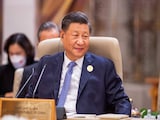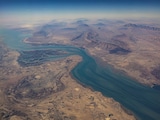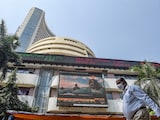The whole thing is like a very badly written play, with the finale still questionable. Trump sets sail for Pakistani waters for ‘unimaginable' oil riches, and signs a trade deal too, which seems far more generous than almost anyone else, including India. In some ways, it's all very predictable. Pakistan's generals always court US presidents, and usually with considerable success; perhaps it's something to do with the uniform. But this time, the whole affair is unprecedented in its apparent intimacy. But hang on. As always with Pakistan, nothing is as it seems.
The Trade-Offs
First, the trade deal. Reliable reports say that Islamabad has got itself a 19% reciprocal tariff deal on a wide range of its products, far lower than the 29% initially threatened under an Executive Order signed by the President. Other countries, like Bangladesh, face a 20% tariff. The US is Pakistan's largest export destination for textiles, where it competes with India, Cambodia and China, among others, and potentially, a higher tariff on these countries should profit Pakistan. But the reality is that it doesn't. Poor industry practices, smaller volumes and high base costs mean that Pakistan only has a slight advantage in at least levelling the playing field.
Besides, China, the largest competitor, seems to still be in the game. Pakistan's total exports to the US are at about USD 5.552 billion, compared to India's USD 86 billion, but it matters to a far smaller economy. Which is probably why the tariff rates are comparable to those levied on Nicaragua and Papua New Guinea. On the whole, it is a relief to an embattled economy, but no great reward.
All The Wonderful Oil
The deal was negotiated over 90 days, and a day prior to this was another far more surprising announcement. Trump, in his typical hyperbolic fashion, announced on his Truth Social channel that the countries had signed a deal to exploit Pakistan's ‘massive oil reserves'. Pakistan's official sources seemed to have been struck dumb by the announcement, with officials only praising the trade deal (without revealing the exact numbers involved). Prominent media largely followed suit, as industry experts scanned maps to find the ‘ massive' oil fields.
True, for some years now, Pakistan has been talking about such finds, with most notably Imran Khan announcing this in early 2019. But eventually, drilling in Kekra-1, some 280 km in deep waters off the Karachi coast, was suspended when nothing was found. This was an effort together with the US giant Exxon Mobil and an Italian firm. In 2024, the ‘massive oil reserves' story was back, this time with apparent assistance from an unknown 'allied nation', at the time assumed to be Saudi Arabia's Aramco. This time, officials were cautious, warning that it could cost some $5 bn for just exploration, and years to actually exploit the resource if it's actually found. Given that no major oil companies came rushing to Pakistan after this announcement, in fact, and that Shell and Total, among others, left Pakistan due to security issues and the sheer difficulty of doing business, it seemed that this was also an issue of mere wishful thinking.
No doubt, the Indus River basin that flows into the sea - where India's Bombay High is also located - potentially can have oil reserves. But the difficulty lies in finding exploitable resources. Also note, India's firms took years to find the right spots for drilling. The question is, will foreign firms care to put in the money and the time for this, not to mention the additional infrastructural facilities involved? Days ago, a major oil find was reported in Sindh, which had interested Chinese firms in 2024. Certainly, several Chinese giants, like the CNPC Chuanqing Drilling Engineering Company, are operating in Pakistan. But there is no indication of any firm going in for ocean drilling. US government agencies, including the Energy Information Administration (EIA), make no mention of any massive oil find and only note declining shale gas reserves.
The Actual Agreement
The actual aspect of all this talk of oil is the fact that Pakistan has, in fact, signed off on a deal to buy its first-ever shipment of crude from a Texas-based arm of Vitol, a company that has operations worldwide. This was signed a day after the reduction of tariffs. Pakistan's buy would presumably be at the cost of its usual West Asian imports; the actual details in terms of pricing are unclear, but it would hardly compete with Saudi Arabia's ‘Special Oil Facility', which recently deferred payment of about $1.2 bn again this year. Pakistan's imports of oil account for some $11.3 bn a year, and about a third of its total import bill. So, any deal that uses one country's money to pay for another is likely to annoy everyone concerned.
The Real Deal
The other ‘deal' is, of course, in foreign policy, where a read-out of the meeting between Foreign Minister Ishaq Dar and US Secretary of State Marco Rubio appreciated Pakistan's “continued willingness to play a constructive role in mediating conversations with Iran”, and, in return, offering counter-terrorism cooperation in Afghanistan. Pakistan seems to be delivering on the first. Iranian President Masoud Pezeshkian was in Pakistan on Saturday and Sunday on his first-ever visit, together with a high-level delegation.
The visit was described by Iranian news as a ‘strategic milestone'. Expect some heavy-handed action against Taliban-based terror groups in return. But that will mean US drones and operators, together with military contracts and some troops in Pakistan to deal with its worst nightmare, the Tehrik-e-Taliban, as well as other Afghanistan-based groups. That is what Islamabad has been playing for all along.
For the US, this is a foreign policy ‘deal' that Trump will trumpet, even while it sends a signal to India of Washington's ability to play the field. The trade deal hardly matters for Trump, since Pakistan is his country's 168th trading partner. But this is also a pushback against China.
When People Comes Knocking
Even as all these ‘deals' were announced, the Field Marshal, Asim Munir, cut a massive cake together with the Chinese ambassador to commemorate the 78th anniversary of the People's Liberation army. This is power balancing of a very high order, even for the ambidextrous army chief. But so far, so good: an apparently non-existent oil deal and a paltry trade deal, in exchange for buying US oil, and a heavy hand on Iran and Afghanistan. Not bad for the very short term.
In the coming days, however, someone's going to come looking for that oil. Something is due to blow, and it's not going to be an oil well.
(Tara Kartha was with the National Security Council Secretariat)
Disclaimer: These are the personal opinions of the author















